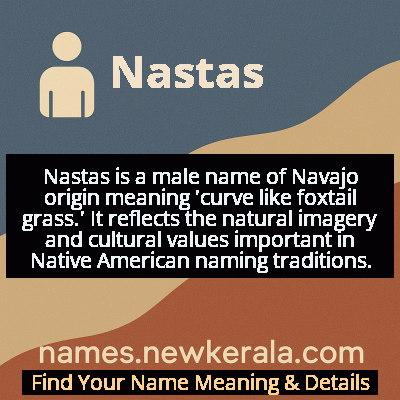Nastas Name Meaning & Details
Origin, Popularity, Numerology Analysis & Name Meaning of Nastas
Discover the origin, meaning, and cultural significance of the name NASTAS. Delve into its historical roots and explore the lasting impact it has had on communities and traditions.
Name
Nastas
Gender
Male
Origin
American
Lucky Number
2
Meaning of the Name - Nastas
Nastas is a male name of Navajo origin meaning 'curve like foxtail grass.' It reflects the natural imagery and cultural values important in Native American naming traditions.
Nastas - Complete Numerology Analysis
Your Numerology Number
Based on Pythagorean Numerology System
Ruling Planet
Moon
Positive Nature
Diplomatic, friendly, artistic, empathetic.
Negative Traits
Over-sensitive, moody, indecisive, prone to self-pity.
Lucky Colours
Green, cream, white.
Lucky Days
Monday.
Lucky Stones
Pearl, moonstone.
Harmony Numbers
1, 3, 4.
Best Suited Professions
Diplomats, mediators, caregivers, artists.
What People Like About You
Cooperative spirit, friendliness, artistic talent.
Famous People Named Nastas
Nastas Begay
Navajo Code Talker
Served as a Code Talker using the Navajo language to transmit secret military messages
Nastas Yazzie
Traditional Weaver
Renowned for preserving and teaching traditional Navajo weaving techniques
Nastas Nez
Environmental Activist
Led conservation efforts to protect sacred lands and water resources in Navajo Nation
Name Variations & International Equivalents
Click on blue names to explore their detailed meanings. Gray names with will be available soon.
Cultural & Historical Significance
Historically, names like Nastas have helped preserve cultural knowledge and environmental awareness across generations. In Navajo culture, names often reflect specific observations of nature, personal characteristics, or significant events, creating a living connection between individuals and their heritage. The continued use of such names represents cultural resilience and the ongoing importance of traditional knowledge systems in contemporary Native American communities. As indigenous naming practices gain broader recognition, names like Nastas serve as reminders of the rich linguistic and cultural diversity within American society.
Extended Personality Analysis
Individuals bearing the name Nastas typically exhibit a unique blend of strength and flexibility, mirroring the qualities of the foxtail grass that inspires their name. They often demonstrate remarkable resilience in facing life's challenges, possessing an innate ability to adapt to changing circumstances without losing their fundamental character. This adaptability is complemented by a deep-rooted sense of identity and tradition, creating individuals who can navigate modern complexities while maintaining strong connections to their cultural heritage. Their approach to problems tends to be thoughtful and observant, taking time to understand situations fully before acting.
There's often a noticeable grace in how people named Nastas interact with others and move through the world. They tend to be patient listeners and careful observers, qualities that make them excellent mediators and trusted advisors. Their connection to natural imagery suggests a person who finds solace and wisdom in the outdoors, often displaying environmental awareness and respect for ecological balance. In relationships, they value harmony and mutual understanding, approaching conflicts with a desire for resolution rather than confrontation. Their strength lies in their quiet confidence and the subtle way they influence their surroundings, much like grass that shapes the landscape through persistent, gentle growth.
Modern Usage & Popularity
In contemporary naming practices, Nastas remains predominantly used within Navajo and Native American communities, serving as an important marker of cultural identity and heritage preservation. While not commonly found on national popularity charts, the name has experienced a modest increase in usage among families seeking meaningful, nature-inspired names with authentic cultural roots. Its usage is most concentrated in the American Southwest, particularly in regions with significant Navajo populations, though it occasionally appears in urban areas where indigenous families maintain cultural traditions. The name represents a broader trend toward reclaiming and celebrating indigenous languages and naming practices, standing as a conscious choice against cultural assimilation. Modern bearers of the name often appreciate its unique quality and the specific natural imagery it evokes, finding value in a name that connects them to both family heritage and environmental consciousness in an increasingly globalized world.
Symbolic & Spiritual Meanings
The symbolic meaning of Nastas extends far beyond its literal translation, embodying profound metaphors about life's journey and human character. The curved form of foxtail grass represents the wisdom of non-resistance—the understanding that sometimes the most effective way to overcome obstacles is to bend and adapt rather than confront directly. This symbolizes emotional intelligence and strategic flexibility in personal growth and relationships. The grass imagery also connects to concepts of humility and community, as grasses grow together, supporting one another while each maintains its individual form. The name carries associations with renewal and persistence, as grasses return season after season, teaching lessons about endurance and the cyclical nature of challenges and opportunities. In a spiritual context, the curved shape may represent the sacred hoop or circle of life central to many Native American philosophies, suggesting wholeness, continuity, and the interconnectedness of all things.

